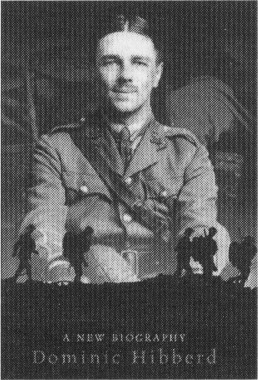|
Search Help |
|
Links Robert Graves Website Other RG Resources |

Reviews
'Wilfred Owen: A New Biography', by Dominic Hibberd
 Wilfred Owen: A New Biography, by Dominic Hibberd.
Wilfred Owen: A New Biography, by Dominic Hibberd.
London: Weidenfeld and Nicolson, 2002. €25. ISBN: 0 297 82945 9. pp. 424.
Wilfred Owen, more than any other poet, has an extremely malleable reputation, allowing critics to employ his work in order to support their own ideological purposes. Any critic working on Owen must be aware that his poetry is subject to the whims of others in much the same way as the soldiers in his poems are subject to the vagaries of the army, the war and death itself. In his new book, Wilfred Owen: A New Biography, Dominic Hibberd acknowledges this fact of Owen scholarship, writing that 'Pacifists have regarded him as a pacifist, socialists as a socialist; feminists, improbably, have assumed he was a feminist' (xviii—xix).
Owen scholars must also deal with the long shadow of Owen's literary executor and younger brother Harold (1897—1971) who, in order to protect the reputation of his family, kept strict control over anything to do with the Owen family. Harold, according to a friend, 'destroyed more papers than he kept' (xviii), and Hibberd points out that Harold's memoir, Journey from Obscurity, the source for much of Wilfred Owen's biographical detail, is flawed when dating certain incidents and even falls victim to family politics that plays itself out within its pages. Hibberd writes that Harold 'was convinced he was writing the truth, and his defenders insist, no doubt rightly, that he was a most honest, honourable man. But he was also a talented artist, and his memoirs are best understood as a series of vivid, imaginative paintings, full of strong colours and contrasts. They illustrate the past as he wanted to remember it, but not necessarily as it really was' (xviii). As such, many of the subsequent studies of Owen, and Hibberd includes his own earlier work, are based on false assumptions and biographical details. Hibberd's new biography then is an attempt, and a successful one at that, to give a more objective account of Owen's life; a poet of Owen's calibre deserves no less.
Dominic Hibberd, an acknowledged expert on Owen who edited a collection of Owen's poetry (1973), is the obvious choice to write this biography. He has published widely on Owen, including books such as the indispensable Owen the Poet (1986) and his initial foray into biographical sketch Wilfred Owen: The Last Year (1992). Hibberd tackles issues, such as Owen's sexuality, that past biographers either are actively hostile to or gloss over. He declares that Owen 'was gay [. . . l . Evidence for sexual relationships is necessarily less obvious, but there are a good many clues that he was neither ignorant nor completely inexperienced' (xix). As Hibberd points out, intimate details of Owen's sexual relationships will probably never be known for certain; Hibberd does highlight a conversation in which, he speculates, Wilfred attempted to reveal
his sexuality to Harold, mimicking Siegfried Sassoon who initially came out to a younger brother. Hibberd concludes that 'Harold was never able to cope with the thought that Wilfred had not been heterosexual' (313).
Another strength of the biography is that Hibberd provides the reader with a lively account of the social contexts that surrounded Owen at certain points in his life. For example, Owen, having moved to France in September 1913 to teach English, witnessed the unveiling of a monument to those who died in the Franco-Prussian War, a war in which the French lost the provinces of Alsace and Lorraine. The atmosphere surrounding the unveiling was charged with feelings of patriotism and anger. Hibberd comments, 'The country was longing for revenge' (111). Hibberd provides a glimpse into the French national psyche and helps to explain why France was so willing to go to war in 1914, connecting Owen's life to the world events that would eventually cost him his life.
Hibberd expertly brings together the works of other scholars, correcting errors in chronology and adding further information, giving additional insight into the events that shaped Owen's life. This is a well-researched and honest biography of one of the most influential poets of the early twentieth century. It is the culmination of the Owen scholarship to date and should be considered the definitive Owen biography.ADVERTISEMENT

THE WILFRED OWEN ASSOCIATION
'And each slow dusk a drawing-down of blinds
The Wilfred Owen Association was formed in
1989 to commemorate the life and work of one of the greatest war poets in the English language, who died in the last week of the Great War.
Philip Larkin described him as 'an original and
unforgettable poet . . . the spokesman of a deep and unaffected compassion'. Owen's influence on later poets has been acknowledged for many years; his poetry is more widely appreciated now than at any time since his death.
The Association's wide range of members represents all
backgrounds and all levels of scholarship and interest.
Since its formation, the Association has established permanent public memorials in Shrewsbury and Oswestry.
In addition to reading, talks, visits and performances, it promotes and encourages exhibitions and conferences, and publishes a regular newsletter. Please contact the Chair:
Meg Crane
21 Culverden Avenue
Tunbridge Wells Kent TN4 9RE e-mail: mmccrane@ukonline.co.uk or visit our website: www.1914-18.co.uk/owen